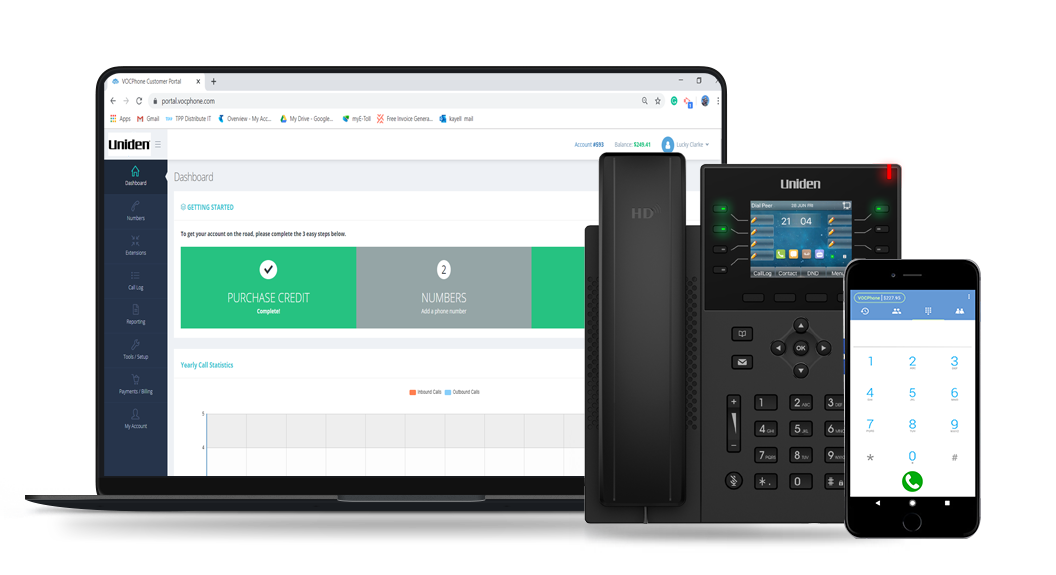
Overcoming the challenges of upgrading to a cloud phone system in Australia
Understanding the challenges that come with a cloud phone installation can help you address them promptly and modernise your business communications easily.

Understanding the challenges that come with a cloud phone installation can help you address them promptly and modernise your business communications easily.
Effective communication in a business setting is recognised as one of the key factors that contribute to a successful business. Businesses understand this and are always looking for ways to evolve. This is why the switch from traditional phones to cloud-based phone systems is on the rise. The scalability, flexibility, and cost-effectiveness they offer make it an attractive option for businesses that want better solutions for a more affordable price. Studies confirm this as 75% of small businesses reported cost savings after switching to a cloud-based phone system.
Even with all these benefits, upgrading to a cloud phone system in Australia isn’t without its challenges. With careful planning and execution, businesses can navigate these obstacles easily. By understanding the challenges they may face and how best to address them, businesses have a much stronger path to improving operational efficiency and customer experience.

Data security and compliance with proper regulations are a concern that many businesses have when switching to a cloud phone system. Businesses need to evaluate the data protection protocols and security measures implemented by the service provider. To address this, your business needs to do its due diligence on prospective cloud providers and review the security protocols they have to make sure that they follow the proper regulations that give your business peace of mind.
Integrating a cloud phone system with your existing business applications and software can be complex. Incompatibility can leave your business with disruptions that you cannot afford. To avoid this, your business should assess your existing infrastructure and identify potential integration points. You should work closely with a cloud provider to ensure seamless integration and look into the customisation options and how they can be tailored to your unique business needs.
For a cloud-based business phone system to operate smoothly, you need to have a reliable and strong internet connection. Poor networks can lead to dropped calls, call quality issues, disruptions, and more. Addressing this involves a thorough network check, upgrading the internet bandwidth and implementing Quality of Service (QoS) measures to prioritise traffic. You can also consider backup internet connections for better business continuity if one network is disrupted.
Transitioning to a new phone system can be overwhelming for employees and can be met with resistance and a steep learning curve. Businesses can develop detailed training programs that cover the features and functionalities of the phone system. Get employees involved from the start, give them hands-on training, and provide them with user guides and support channels for ongoing training. You can even identify champions in the business that can offer peer-to-peer support.
Design menus that direct callers to the relevant department using a professionally created IVR system, reducing wait times and improving customer satisfaction.
Customise your call flows based on the time of day, day of the week, or holidays so that calls are handled differently during peak hours or after business hours.
Don’t have time to answer calls? Have your voicemails emailed directly to your inbox as an audio file so that you never miss out on a single communication.
Convert your written text into natural-sounding audio in several languages and voices to customise your greetings and menu options to suit your business needs.
Enable call recording for quality assurance, training, or compliance requirements and make it easier to retrieve recorded calls for improved employee performance.
A trusted and reliable name in the telecommunications industry, Uniden Voice Over Cloud offers the smartest cloud business cloud-based business phone system in Australia complete with over 40 easy-to-use features and free setup.
Our team of experts are dedicated to helping you stay connected anytime and anywhere with our Voice Over Cloud system, designed to streamline and improve the quality of your business communications.

Take the first step towards better business communication with Australia's trusted cloud phone system.
Cloud phone system providers typically offer integration capabilities through APIs (Application Programming Interfaces) or pre-built connectors. These integrations help businesses seamlessly incorporate their cloud phone system with existing business applications, such as customer relationship management (CRM) software, productivity tools, and collaboration platforms.
Yes. One of the key benefits of cloud phone systems is their scalability. Businesses can easily add or remove users, phone lines, and features as their needs change. This flexibility allows businesses to quickly adapt to growth, seasonal demands, or changing business requirements.
Cloud-based phone systems are designed to support remote and mobile workforces, enabling employees to access the same communication features and functionality from anywhere with an internet connection. Features like softphone applications, mobile apps, and call transfer capabilities help remote workers stay connected and productive, regardless of their location.
Businesses can port their existing phone numbers to the new cloud phone system for business continuity and minimised disruption. Cloud providers offer number porting to streamline the process. In some cases, businesses may choose to have new phone numbers optimised for their cloud solution.
Cloud phone system providers offer comprehensive call recording and storage solutions to help businesses meet compliance requirements. Calls can be recorded and securely stored in the cloud, with options for customisable retention periods and automated backups.